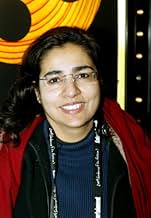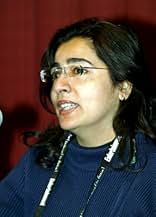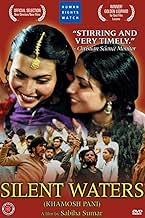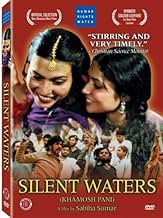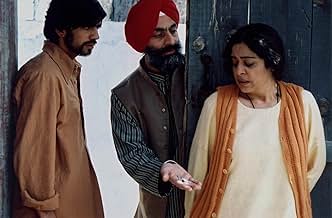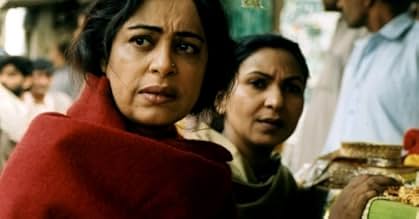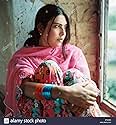CALIFICACIÓN DE IMDb
7.5/10
1.3 k
TU CALIFICACIÓN
Agrega una trama en tu idioma1979. A village in Pakistan. A widow sees her 17 years old son being attracted to Islamist militants. It brings her past back.1979. A village in Pakistan. A widow sees her 17 years old son being attracted to Islamist militants. It brings her past back.1979. A village in Pakistan. A widow sees her 17 years old son being attracted to Islamist militants. It brings her past back.
- Dirección
- Guionistas
- Elenco
- Premios
- 8 premios ganados y 2 nominaciones en total
Aamir Ali Malik
- Saleem
- (as Aamir Malik)
Navtej Singh Johar
- Jaswant
- (as Navtej Johar)
Arshad Mahmood
- Mehboob
- (as Arsad Mahmud)
Fareeha Jabeen
- Shabnam
- (as Fariha Jabeen)
- Dirección
- Guionistas
- Todo el elenco y el equipo
- Producción, taquilla y más en IMDbPro
Opiniones destacadas
This is an outstanding movie, illustrating life in rural Punjab in Pakistan and how the ugly scepter of religious fundamentalism raises its head and disrupts the peaceful flow of village life under General Zia. At the every end, it refers to the current version of an old story under yet another General, Musharaf.
The central story is about Ayesha, a Sikh girl abducted and left behind during the Partition, who has made a new life for herself in Pakistan, being forced to take on a new identity, marrying one of her abductors, and raising a son she dotes upon. The return of her long lost brother as a pilgrim and the taking over of the village by fanatics ends up destroying the life she had created. Kirron Kher in the lead role is very good and all the actors do a great job.
My only concern is that viewers without a close understanding of the India Pakistan Partition may miss out some of the subtleties. That however did not stop the judges at a European film festival from awarding the best actress prize to Kirron Kher.
The central story is about Ayesha, a Sikh girl abducted and left behind during the Partition, who has made a new life for herself in Pakistan, being forced to take on a new identity, marrying one of her abductors, and raising a son she dotes upon. The return of her long lost brother as a pilgrim and the taking over of the village by fanatics ends up destroying the life she had created. Kirron Kher in the lead role is very good and all the actors do a great job.
My only concern is that viewers without a close understanding of the India Pakistan Partition may miss out some of the subtleties. That however did not stop the judges at a European film festival from awarding the best actress prize to Kirron Kher.
Khamosh Pani will go down in Pakistani history as the most important work of art and politic since the country's inception. The story documents the era (1979) of the CIA-assisted killing of the democratically elected prime minister Bhutto and the installation of fundamentalist dictator General Zia ul-Haq. The film chronicles the death of love and the birth of hate as part of a continuing cycle of violence that has besieged that part of the world. Religious intolerance, bigotry and ignorance are the fierce villains of the movie. The film has managed to humanize the tragedy of the Pakistani people's struggle with fanaticism and imported agendas. What I particularly love about this film, besides the fact that it is technically remarkable, is the fact that it does not glorify death or killing. This is not a Bollywood or Lollywood melodrama. Beautiful punjabi language script adds to the authenticity of this true-to-life cinema representation of the people of the land. This film is brave to acknowledge the atrocities of displacement; of the violence against Sikhs and against women that was part of the partition of India and Pakistan. Well acted, well written and extremely well directed. Bravo!
I am at a loss of words after watching this one which is more than a film, it is an experience therefore, the only words in which this masterpiece can be described are adjectives-mind blowing, shocking, great in narrative and style, simple and subtle, poignant, brilliant exposition. Here is finally a movie, that shocks you, surprises you, questions you, slaps you, make you cry, shows you a mirror-to sum up evoke strong responses. The film finally succeeds in speaking a universal language. Here No sides are taken but just roots you to the middle of the premise. It touched the epic proportions of earlier masterpieces Garam Hawa and Tamas, based on partition issues. Though an influence of Iranian new wave cinema is seen on film maker sabiha sumer yet it is an original piece. A superior product, a touching tale, a classic world cinema, indeed.. "Jinhe naaz hai Black par wo kahan hain".
Perhaps the first south Asian film that has had such a lasting impression on me, Khamosh Pani has hardly received the glory it truly deserves. Watching the film leaves you senseless for about half an hour and then it knocks all the wind out of you.
Khamosh Pani takes the viewer to a small village in Pakistan where life evolves. Specifically it focuses on Ayesha and her son Saleem and their relationship. Ayesha never goes to the village well to draw water while Saleem gets seduced by Islamic fundamentalists and transforms from a love sick puppy to the man he thinks he wants to be.
Sabiha Sumar, perhaps one of the best directors in the subcontinent, tells us the story of a small village in Pakistan. With perhaps one of the most powerful issues to deal with, Sumar displays true genius by making everything seem so subtle and hauntingly real. Perhaps, the greatest strength lies in convincing the audience that the statement need not be made in black and white and in this respect Sumar shines.
To say that the acting performances were excellent would be the understatement of the century. One watches in amazement at how real and authentic each character is. The mind knows that what it sees are actors and yet it refuses to believe what it knows. Every single character, from an extra to the leads adds to the tremendous energy that the film brings with it. Kirron Kher as Ayesha/Veero is stunning, so much so that one cannot imagine her as anyone else. Aamir Ali Malik is another actor who plays with the audience, seducing them and disturbing them through the course of the film As an Indian separated from the partition by two generations I can't really say that I feel the pain that my mother does when she sees a film such as this, I have heard stories of my grand aunt who was attacked and mutilated by a mob in Lahore when my mothers family had to leave for India. Perhaps my lack of sentimental attachment makes me see it a little more objectively. Khamosh Pani has exposed me to some of this pain and while it may not be my own I can feel it. But the question that arose in my mind is that those that were around when this bloodshed (on both sides) occurred have mostly died or are dying, will we succeeding generations ever know this pain? The pain of leaving behind a wife, killing your own daughter, leaving her to be raped, Living in another country when that which was once a part of you lives somewhere else. How can I fight for this when I don't know what its like? Khamosh Pani made me feel this pain for a few days; perhaps we need more reminders such as these so that we can experience the pain to forget.
Khamosh Pani takes the viewer to a small village in Pakistan where life evolves. Specifically it focuses on Ayesha and her son Saleem and their relationship. Ayesha never goes to the village well to draw water while Saleem gets seduced by Islamic fundamentalists and transforms from a love sick puppy to the man he thinks he wants to be.
Sabiha Sumar, perhaps one of the best directors in the subcontinent, tells us the story of a small village in Pakistan. With perhaps one of the most powerful issues to deal with, Sumar displays true genius by making everything seem so subtle and hauntingly real. Perhaps, the greatest strength lies in convincing the audience that the statement need not be made in black and white and in this respect Sumar shines.
To say that the acting performances were excellent would be the understatement of the century. One watches in amazement at how real and authentic each character is. The mind knows that what it sees are actors and yet it refuses to believe what it knows. Every single character, from an extra to the leads adds to the tremendous energy that the film brings with it. Kirron Kher as Ayesha/Veero is stunning, so much so that one cannot imagine her as anyone else. Aamir Ali Malik is another actor who plays with the audience, seducing them and disturbing them through the course of the film As an Indian separated from the partition by two generations I can't really say that I feel the pain that my mother does when she sees a film such as this, I have heard stories of my grand aunt who was attacked and mutilated by a mob in Lahore when my mothers family had to leave for India. Perhaps my lack of sentimental attachment makes me see it a little more objectively. Khamosh Pani has exposed me to some of this pain and while it may not be my own I can feel it. But the question that arose in my mind is that those that were around when this bloodshed (on both sides) occurred have mostly died or are dying, will we succeeding generations ever know this pain? The pain of leaving behind a wife, killing your own daughter, leaving her to be raped, Living in another country when that which was once a part of you lives somewhere else. How can I fight for this when I don't know what its like? Khamosh Pani made me feel this pain for a few days; perhaps we need more reminders such as these so that we can experience the pain to forget.
Every now and then you are suddenly hit by a movie that leaves an impression on you. This movie has the potential for the same.
If I ever to describe the movie in one word - that would be "moving". It indeed moved me. After the movie my only response was silence. I just didn't know how to react. It was an experience - though a very real one. It was as if you are witness to the events and you feel so frustrated that there is nothing you can do about it.
I could write about the story of the movie, however a part of the fun in the movie is the way the story unfolds itself. So I better keep mum on that. I would just mention that the story is set in Rawalpindi area of Pakistan and its the story about a mother and a son living there. Though its not a social statement, it touches upon the issues of religion, partition, coexistence, terrorism besides being an emotional and philosophical drama.
On the movie making, I think its a brilliantly written script. A dialogue that I still remember from the film is when the mother says - "If the son is not mine then who in the world is." It is a painful acceptance of the solitude and the loneliness of each and everyone of us.
The acting is almost perfect. In fact it seems that there are no actors in the movie. Its as if real people are living those lives. I wonder how the director found such actors. Kiron Kher, in her central role as the mother, has outperformed herself. Her silence is so expressive, that she doesn't need any dialogues.
On the whole I think the movie deserves great credit. I am terribly disappointed at the (current) 6.8 rating at IMDb. I realize that its a non-populist movie but I would have felt that anybody who ended up seeing the movie would be affected by it. As for me, I give it a perfect 10.
If I ever to describe the movie in one word - that would be "moving". It indeed moved me. After the movie my only response was silence. I just didn't know how to react. It was an experience - though a very real one. It was as if you are witness to the events and you feel so frustrated that there is nothing you can do about it.
I could write about the story of the movie, however a part of the fun in the movie is the way the story unfolds itself. So I better keep mum on that. I would just mention that the story is set in Rawalpindi area of Pakistan and its the story about a mother and a son living there. Though its not a social statement, it touches upon the issues of religion, partition, coexistence, terrorism besides being an emotional and philosophical drama.
On the movie making, I think its a brilliantly written script. A dialogue that I still remember from the film is when the mother says - "If the son is not mine then who in the world is." It is a painful acceptance of the solitude and the loneliness of each and everyone of us.
The acting is almost perfect. In fact it seems that there are no actors in the movie. Its as if real people are living those lives. I wonder how the director found such actors. Kiron Kher, in her central role as the mother, has outperformed herself. Her silence is so expressive, that she doesn't need any dialogues.
On the whole I think the movie deserves great credit. I am terribly disappointed at the (current) 6.8 rating at IMDb. I realize that its a non-populist movie but I would have felt that anybody who ended up seeing the movie would be affected by it. As for me, I give it a perfect 10.
¿Sabías que…?
- TriviaThe film had trouble finding a distributor for theatrical release in Pakistan, due to perceived lack of market. Despite this the filmmakers organized 41 free screenings throughout small towns and villages all across the country, starting with a premiere in Wah, where the film was shot.
- ConexionesFeatured in Women Make Film: A New Road Movie Through Cinema (2018)
Selecciones populares
Inicia sesión para calificar y agrega a la lista de videos para obtener recomendaciones personalizadas
Detalles
- Fecha de lanzamiento
- Países de origen
- Sitios oficiales
- Idiomas
- También se conoce como
- Silent Waters
- Locaciones de filmación
- Productoras
- Ver más créditos de la compañía en IMDbPro
Taquilla
- Total en EE. UU. y Canadá
- USD 7,384
- Fin de semana de estreno en EE. UU. y Canadá
- USD 1,617
- 10 oct 2004
- Total a nivel mundial
- USD 7,384
Contribuir a esta página
Sugiere una edición o agrega el contenido que falta

Principales brechas de datos
What is the French language plot outline for Khamosh Pani (2003)?
Responda
